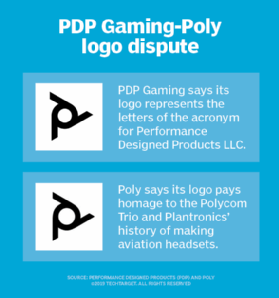PDP Gaming alleges Poly copied its logo
The gaming accessories company PDP Gaming has sued Poly in federal court, alleging the Plantronics-Polycom merger copied PDP's logo.
The gaming accessories company Performance Designed Products LLC has filed a federal lawsuit accusing Poly of using a knockoff of its logo as the centerpiece of a major rebranding initiative launched last week.
The lawsuit accuses Poly of violating federal trademark law through use of the new logo, which PDP Gaming argues is nearly identical to a logo it began using publicly in October 2018. It seeks monetary damages and a permanent injunction against Poly's use of the logo.
"We do not comment on ongoing litigation generally, but we developed our logo independently and dispute the claims raised," a Poly spokesperson said in a statement.
Plantronics acquired Polycom last year, and the two companies rebranded as Poly at the Enterprise Connect conference on March 18. The move was a significant and risky step for Poly, as it opted to retire two brands with strong name recognition.
In a press release, Poly said its new logo paid homage to the Polycom Trio conference room phone and to Plantronics' history of making headsets for airplane pilots.
PDP Gaming developed its logo in March 2018, posted its logo online in October 2018, and began accepting pre-orders for a headset bearing the logo in January 2019, according to the company's lawsuit, filed last week in U.S. District Court in southern California.
The lawsuit makes no mention of any attempt by PDP Gaming to gain formal recognition of its logo from the U.S. Patent and Trademark Office (USPTO). However, such recognition is not necessary for bringing suit under certain sections of federal trademark law.
"The absence of a registration is not great, but it's certainly not a significant problem either," said Bruce Ewing, an intellectual property attorney and partner at Minneapolis-based Dorsey & Whitney LLP.

In part, the lawsuit accuses Poly of violating a section of the law related to use of a symbol in a way that may cause confusion over the true origins of a product. PDP Gaming and the Plantronics division of Poly both make consumer headsets for gaming.
PDP Gaming's relatively brief use of the logo could play in Poly's favor, Ewing said. The court will take into account not just the marks but the words and marketing surrounding each. However, Poly may need to explain how it developed a logo of such a similar design.
"[PDP Gaming] has not been using the mark, this logo that it created, for all that long," Ewing said. "So I think there is a legitimate question about the extent to which consumers associate that design with [PDP Gaming]."
PDP claims trademark approval pending
An attorney for PDP Gaming, Laura Chapman, of the Los Angeles-based firm Sheppard, Mullin, Richter & Hampton LLP, said in an email Thursday that her client had filed a trademark application for its logo with the USPTO. However, she did not respond to a follow-up question about when that request was lodged.
Poly filed a trademark request for its logo with the USPTO on Feb. 28. The lawsuit seeks denial of that application.
For Poly, the lawsuit is a public relations headache that comes at a significant moment in the merger of Plantronics and Polycom. But the court case is unlikely to affect products or the Poly name, said Zeus Kerravala, principal analyst at ZK Research, based in Westminster, Mass.
"It might make you raise your eyebrows as to how that could happen, but ultimately I don't think it's going to hurt Poly from a sales or marketing perspective," Kerravala said. "At worst, it's an embarrassing situation that they have to work through."








